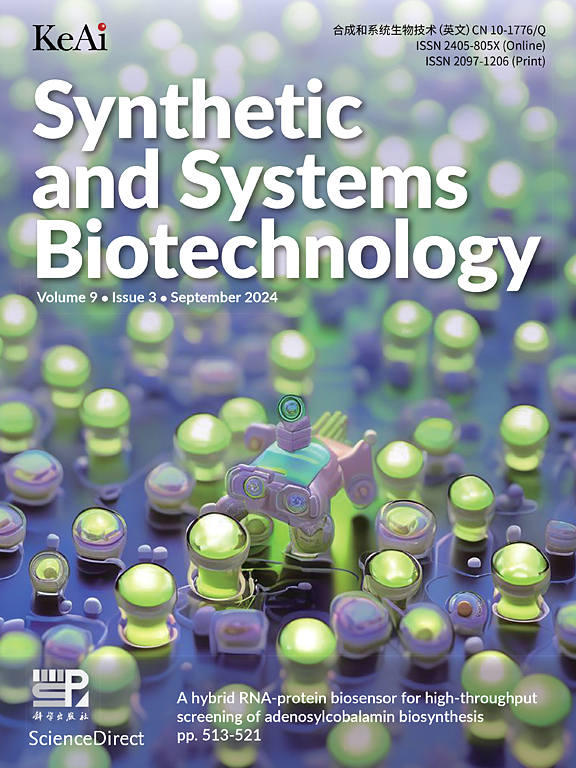Promoter engineering for enhanced 3-hydroxypropionic acid production in Pichia pastoris
IF 4.4
2区 生物学
Q1 BIOTECHNOLOGY & APPLIED MICROBIOLOGY
引用次数: 0
Abstract
Enabling tools are essential for facilitating the methanol bioconversion in Pichia pastoris. However, there is still a relative lack of promoters that can stably express high levels without being affected by the carbon source, which hinders the construction and modification of cell factories containing long metabolic pathways. This study mapped a gene expression intensity library of central metabolic pathways in P. pastoris under methanol and glucose conditions. Through modification of the upstream sequences of promoters, an artificial promoter PS2 was developed with a strong intensity up to 90 % of PGAP. By using this promoter, we successfully constructed a hybrid pathway that integrates the β-alanine and malonyl-CoA pathways for the production of 3-hydroxypropionic acid. Further combining rational metabolic engineering strategies, such as optimizing gene copy numbers and blocking byproduct synthesis pathways, the engineered strains CHP9 and CHP20 achieved 3-HP titers of 23 g/L and 22 g/L by using methanol as the sole carbon source. These results indicate that adaptive strength of promoters can facilitate efficient chemical biosynthesis in methanol bioconversion by mitigating glucose repression effects. This work preliminarily explored the expression patterns of genes in the central metabolic pathways of P. pastoris, identified and characterized the intensities of various endogenous promoters, and extended the enabling toolbox for P. pastoris. This result also lays a foundation for the construction of microbial cell factories and the industrial production of 3-HP via methanol bioconversion.

毕赤酵母促进3-羟基丙酸生产的启动子工程
使能工具对于促进毕赤酵母中的甲醇生物转化是必不可少的。然而,相对缺乏能够稳定高水平表达而不受碳源影响的启动子,这阻碍了含有长代谢途径的细胞工厂的构建和改造。本研究绘制了甲醇和葡萄糖条件下巴斯德酵母中心代谢途径的基因表达强度文库。通过对启动子上游序列的修饰,获得了一个强度高达90% PGAP的人工启动子PS2。通过使用该启动子,我们成功构建了一个整合β-丙氨酸和丙二酰辅酶a途径的杂交途径,用于生产3-羟基丙酸。进一步结合优化基因拷贝数、阻断副产物合成途径等合理的代谢工程策略,以甲醇为唯一碳源,工程菌株CHP9和CHP20的3 hp滴度分别为23 g/L和22 g/L。这些结果表明,启动子的自适应强度可以通过减轻葡萄糖抑制作用来促进甲醇生物转化中有效的化学生物合成。本工作初步探索了巴斯德酵母中心代谢途径中基因的表达模式,鉴定并表征了各种内源性启动子的强度,扩展了巴斯德酵母的使能工具箱。这一结果也为微生物细胞工厂的建设和甲醇生物转化3-HP的工业化生产奠定了基础。
本文章由计算机程序翻译,如有差异,请以英文原文为准。
求助全文
约1分钟内获得全文
求助全文
来源期刊

Synthetic and Systems Biotechnology
BIOTECHNOLOGY & APPLIED MICROBIOLOGY-
CiteScore
6.90
自引率
12.50%
发文量
90
审稿时长
67 days
期刊介绍:
Synthetic and Systems Biotechnology aims to promote the communication of original research in synthetic and systems biology, with strong emphasis on applications towards biotechnology. This journal is a quarterly peer-reviewed journal led by Editor-in-Chief Lixin Zhang. The journal publishes high-quality research; focusing on integrative approaches to enable the understanding and design of biological systems, and research to develop the application of systems and synthetic biology to natural systems. This journal will publish Articles, Short notes, Methods, Mini Reviews, Commentary and Conference reviews.
 求助内容:
求助内容: 应助结果提醒方式:
应助结果提醒方式:


